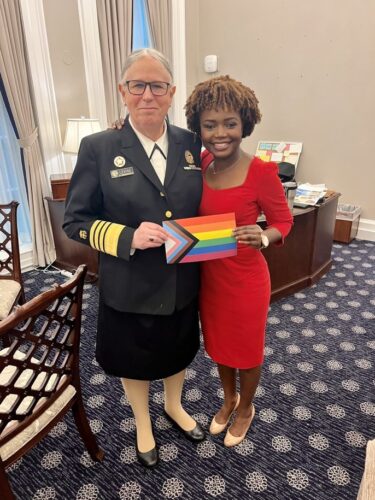In celebration of Pride Month, Wiki Education recruited participants, particularly faculty or graduate students in the LGBTQ+ community, for another Wiki Scholars course focused on expanding Wikipedia’s coverage of notable LGBTQ+ people.
We regularly run Wiki Scholars courses throughout the year, but the way this course came to be was especially important to us. “We are so grateful to the estate of B.B. Clark for generously supporting this Wiki Scholars course,” said Andrés Vera, Wiki Education’s Equity Outreach Coordinator, who made this connection. “Mr. Clark was a victim of the AIDS pandemic and vowed that none of his anti-gay family would receive a portion of his estate. While so many people try to erase the stories of LGBTQ+ people, in the after life, Mr. Clark is helping us preserve LGBTQ history.”
You can see one example of improving the historical record in the article about AIDS activist Reggie Williams. It is now a substantial Wikipedia biography, thanks to Wiki Scholar Dan Royles. Before the course, Reggie’s biography did mention his activism work. But after the course, the biography tells a much deeper story of his life-mission making AIDS education and services more culturally relevant for gay and bisexual men of color. You can now read about Reggie’s impact at both a local and national level. He became an adviser to the San Francisco AIDS Foundation and the San Francisco Department of Public Health, submitted a proposal to the Centers for Disease Control’s national AIDS education program, and was instrumental in starting multiple organizations for on-the-ground AIDS education in San Francisco.

In addition to Reggie William’s biography, Ruth Bleier now has a more detailed one. Wiki Scholar Jenny Lenkowski worked on it, enhancing sections about the neurophysiologist’s activism work during the era of McCarthyism. Ruth was an early explorer of how gender bias affected her field and she advocated for change. In addition to following her own personal mission to better represent a diversity of scientists on Wikipedia, Jenny — as an Associate Professor of Biological Sciences at Goucher College who teaches with Wikipedia — has new perspective to take back to her Wikipedia assignments.
“This course was a great way for me, as an instructor who has assigned Wiki Education projects in my classes, to more intentionally contribute to Wikipedia in a meaningful way myself,” Jenny told us. “I try to emphasize to my students the benefits of us contributing to Wikipedia to increase the diversity of Wikipedians and to also consider profiling scientists from underrepresented groups for their project, so this was a great opportunity for me to explore and contribute to biographies of scientists in the LGBTQ+ community. It took me quite a while to finally decide what page I would be working on, something I see some students struggle with as well. I also benefited from weekly discussions of how projects were going, something I’ll be more intentional about doing next time I assign a similar project.”

One more example comes from Wiki Scholar Sara Moore, an Associate Professor of Sociology at Salem State University, who greatly expanded Rachel Levine’s biography page. Rachel Levine made history as the first openly transgender government official to hold an office requiring a Senate confirmation, serving as assistant secretary of health since 2021. Sara added a section to Levine’s biography about her commitment to solving US health disparities, especially as they relate to LGBTQ+ youth.
“You feel empowered when you learn how to contribute meaningfully to a body of knowledge that so many people draw on,” Sara told us. “It’s also important to bolster the stories and experiences of underrepresented groups of people and their histories.” Although there is a lot more work to do regarding the preservation of LGBTQ history, we’re pleased courses like this can have such an impact on Wikipedia.
If you’d like to peruse more great work that came out of our first iteration of this course, follow this link.
Thumbnail image shows Rachel Levine and White House Press Secretary Karine Jean-Pierre holding a Pride flag in 2022. Public domain, via Wikimedia Commons.
